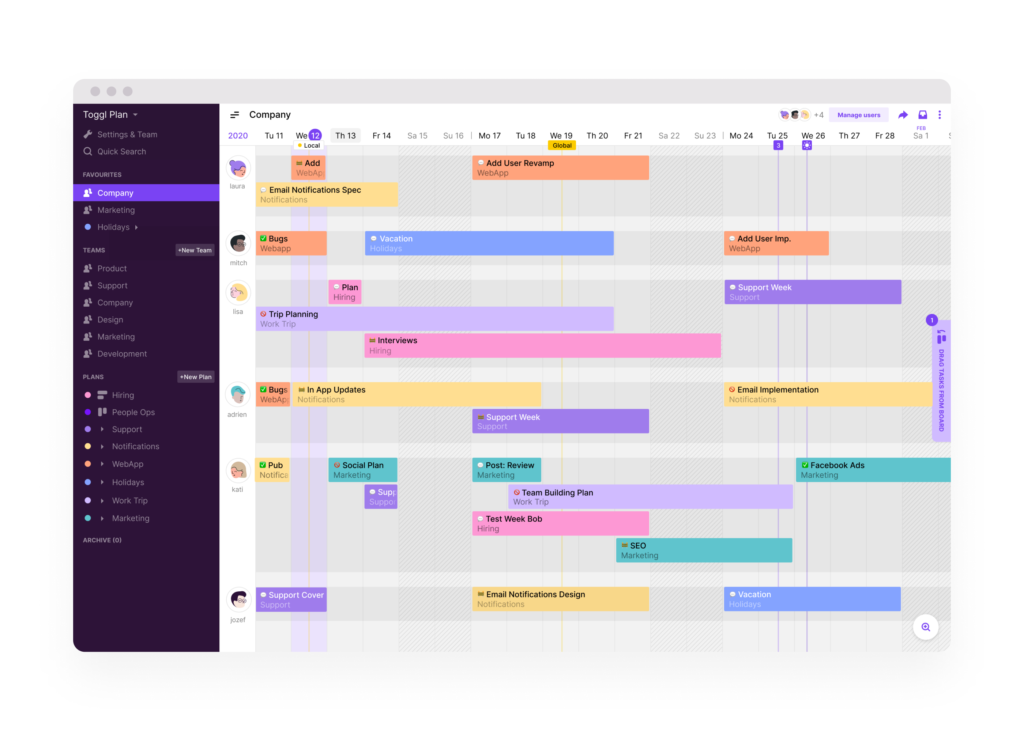While everyone knows teamwork in the workplace is important, the hard part can often be getting everyone to work together. Whether someone runs a Fortune 500 company or a local coffee shop, there are common pitfalls to watch out for. From role uncertainty to unclear team goals, these problems can quickly get in the way of successful collaboration.
Avoiding Common Pitfalls
If you want to get people working together, you need to give them clear, understandable goals. Your team has to know what they need to do in order to actually do it. In addition, you need to clarify roles, so your team members know who is taking care of which task.
A good leader understands the different talents and skills represented by the team. This helps the leader determine who gets a certain task. Each task assignment should be based on the individual’s specific abilities and skill level.
Teamwork is also based around trust. As a group, everyone must complete tasks together, make decisions as a team, and rely on each other’s work. Because of the importance of trust in teams, many team building tasks focus extensively on this skill.
Lack of participation and disengagement are also fairly common problems. A team needs direction and a clear goal for everyone to stay motivated. If the team members can’t understand the larger picture, they find it difficult to get engaged or want to participate.

What Is Teamwork in the Workplace?
Teamwork is an essential part of any company’s success. It involves multiple people at the company working together to achieve a larger goal. The team leader communicates the team’s goal, and then everyone works together to accomplish it.
Learning how to implement teamwork is the hardest part. Part of the leader’s job is to make everyone feel included and accepted by the team. This may mean offering diversity training or creating inclusiveness policies.
At the very least, the team leader should work to engage team members who seem shy or uncomfortable taking part in the team. Everyone has great ideas, but some team members may be uncomfortable expressing them with the pressure of a group listening in. Learning how to recognize communication styles, deal with team conflict, and move on are simply additional aspects to getting along as a group.
Why Is Teamwork in the Workplace Important?
Many managers are unaware of how teamwork benefits the workplace, so they avoid using teams. In other cases, managers avoid teams because they are afraid groups will be ineffective or even lead to conflict. But the reality is that teamwork in the workplace is extremely useful if leaders learn how to help their teams do it properly.

With a team, workplaces can improve employee retention and morale. It allows employees to learn from each other, gain feedback, and collaborate to build new ideas. Plus, peer pressure helps to increase accountability for everyone involved in the project.
So once you’ve determined why it’s important, the real question is how can teamwork be improved in the workplace? Managers can encourage new ideas, drive innovation, and find success by using any of the following 15 ideas.
1. Set Clear Roles
If you want to improve teamwork in the workplace, start by setting clear roles. Otherwise, multiple team members may end up doing the same tasks, or no one will do them at all. Plus, if people feel the roles are unclear, they may begin to think the workload is being unfairly delegated and become resentful.
For everyone to work together, they need to know their specific role. Ultimately, this will prevent hard feelings and possible confusion for everyone involved.
2. Encourage Teammates to Visit Socially
When everyone has a close relationship with each other, it is easier for them to get the job done. Rather than force relationships through team building, try to encourage team members to organically build these relationships outside of work. Managers can help the process along by budgeting for activities like social meetups or lunchtime potlucks.
3. Ask for Help
Sometimes, team members and team leaders forget a team exists to make the entire project easier. To become better at teamwork, everyone has to reach out for help when they need it. Whether the individual needs expertise or moral support, the rest of the team is always there to lend a hand.

4. Communication Is Key
Nothing is worse than finishing a task only to realize someone else has already done it. When working as a team, it is important to communicate continuously about the workflow, upcoming tasks, and team roles. Otherwise, some of the tasks won’t be finished and others will be finished twice.
Luckily, tools like Toggl Plan make communicating among team members easier than ever before. The platform allows you to have a visual overview of what everyone is doing, so you can easily delegate and review tasks.
5. Ask Everyone for Feedback
Good ideas can come from anyone in a team. If you want your company to be successful, ask everyone for their ideas and always listen to their feedback.
Try holding brainstorming sessions among team members. For shy team members, a one-on-one meeting with the team leader might be a more comfortable environment for speaking up.
6. Make the Right Choice in Team Members
You could try to train everyone to be a good team member, but it will always be easier to start with a talented, team-oriented group of employees instead. If you are involved in hiring, work to choose people who will be able to take part in a team. At the very least, try to recruit team members who have the skills and personality type to do well in a team environment.

7. Create a Shared Vision
If you want everyone to do their best work, they have to know the bigger picture and where you want the company or department to go. Rally your team members around a common goal, mission, or vision. Set milestones along the way, so team members can easily tell if they are measuring up.
8. Develop a Review Process
Sometimes, team members fail because they don’t realize what they are doing wrong. Without constructive feedback, individuals don’t have an opportunity to improve. Try creating review meetings for everyone on the team.
These review meetings can help bring the team’s goals into focus. It allows team members to become better at their jobs and helps the team catch problems they may have missed otherwise.
9. Celebrate as a Team
Team members have to fix problems and work together to reach shared goals. They should also take time to celebrate achievements as well. From thanking each other for putting in extra work to celebrating milestones together, there are many ways team members can congratulate each other on their successes.

10. Share the Workload
High-achieving employees have a tendency to take on more and more tasks. Meanwhile, low performers may be more than happy to give up a task to someone else, which can lead to resentment. For a team to do its best, everyone needs to learn how to share the workload.
If you want to help your team members, delegate tasks fairly and accomplish major goals using a program like Toggl Plan. This software makes it easy to track what each person on the team is doing and to delegate upcoming tasks.

11. Stop Micromanaging
This tip goes hand in hand with the last one. While a team leader may need to delegate different tasks, they should never micromanage them. Employees are adults and should always be treated as such.
People tend to resent micromanagers, and micromanaging tends to discourage people from taking the initiative. If you want your team to succeed, give team members the deadlines, tools, and goals they need to get started. Afterward, step back and let the team handle everything else.
12. Set Ground Rules
With so many different people trying to work together, there is always the potential for conflicts along the way. Set some ground rules before working together for the first time or any time someone new is added to the team. This will help everyone know how to act as a group and what to do if there is a problem later on.
13. Be Willing to Steer the Conversation
Brainstorming sessions are a great way for team members to contribute new ideas and find better solutions. Sometimes, these team meetings can end up going off on a tangent. When this happens, try to steer the conversation back to the main topic, so you don’t end up wasting precious time.

14. Improve Transparency
Sometimes, managers try to jealously guard information because they intuitively feel like knowledge is power. When it comes to a team, information is truly made to be shared. Without the right information and a clear, shared goal, the team will be unable to make any headway.
Toggl Plan’s project management software can help you boost transparency among your team members. You can constantly keep all your team members informed of who is assigned to which role and how much each person has accomplished.
15. Never Assume Problems Will Go Away
When a small problem develops, people have a tendency to ignore it and hope it goes away. But most small problems spiral into major issues over time. When you see a problem developing on your team, take action and fix it before this has the chance to happen.
Ready to Help Your Team Work Better Together?
The importance of teamwork is often underrated. By encouraging teamwork in the workplace, managers can inspire innovative ideas and different approaches to common problems. As people develop teamwork skills and relationships with one another, they become more committed to both the group and the company.
To achieve a team-oriented environment, it only takes a few simple changes. From choosing the right team management programs to encouraging feedback, managers can help team members achieve their goals.
Get your company, team, or department on the right track with Toggl Plan’s project management software. Sign up today to start your free trial and see what it can do for you!
Logan Derrick is a full-time business writer and content marketing strategist. For years, he has worked closely with several project management professionals, learning from them and increasing his own knowledge of the industry. Having held multiple management positions in fields ranging from customer service to marketing, Logan has found a passion for helping others learn about project management, marketing, and the powerful tools available to professionals today.
![10 Best Workload Management Software & Tools [2024]](images/resource-management-tools-min-675x404.png)

